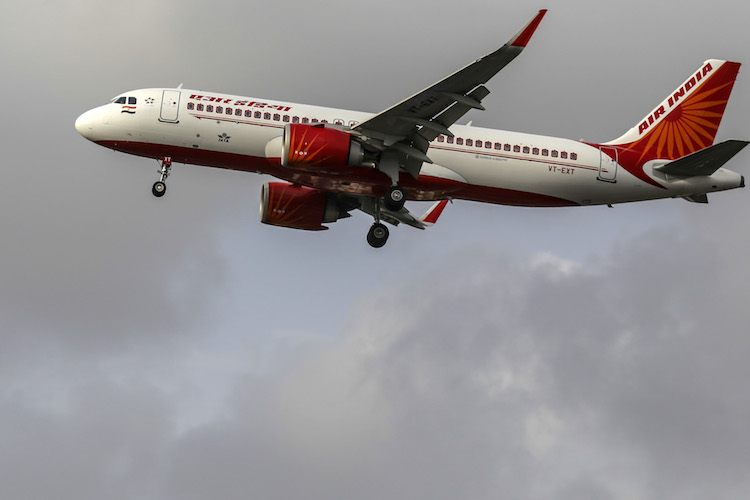COVID-19 Fallout: Air India Pilots' Unions Seek Urgent Financial Aid

In a letter to Civil Aviation Minister Hardeep Puri, two Air India pilots’ union — Indian Aviation Guild and the Indian Commercial Pilots Association — have sought urgent financial aid, citing their duties performed during the COVID-19 rescue operations.
"As you are fully aware, the outbreak of coronavirus is wreaking havoc across the globe. During this perilous time, Air India employees have gone above and beyond to get our countrymen back from Covid-19-affected countries worldwide…Air India has been in a debt trap for quite some time and this will hit the national carrier especially hard. Even now as we write to you, delays in our salary have been commonplace for more than a year. As of date, even January wages have not been paid in full," the letter read.” the pilots’ bodies said in the joint letter.
“On one hand the cabinet has openly praised the recent efforts of Air Indians and the national carrier but on the other, the government has not infused any funds. Our fundamental right to wages for work already done is being flouted time and again,” the letter read. This repeated withholding of wages is straining us financially, said the pilots’ associations. “We urge you to provide urgent financial aid to Air India so that we, the airline's employees, can keep on doing our jobs and (continue) serving the nation,” the letter stated. Meanwhile, global aviation consultancy firm CAPA (Center for Asia Pacific Aviation) has warned that by the end of May-2020, most airlines in the world will go bankrupt. CAPA underlined that coordinated government and industry action is needed - now - if catastrophe is to be avoided. The note goes on to say that "as the impact of the coronavirus and multiple government travel reactions sweep through our world, many airlines have probably already been driven into technical bankruptcy, or are at least substantially in breach of debt covenants". Cash reserves are running down quickly as fleets are grounded and what flights there are operate much less than half full, it added. Forward bookings are far outweighed by cancellations and each time there is a new government recommendation it is to discourage flying. Demand is drying up in ways that are completely unprecedented. Normality is not yet on the horizon. Governments are failing to cooperate At the same time, CAPA stated, while governments are grappling with the health challenges of coronavirus, it is clear that there is little instinct to act cooperatively. Messages are mixed and frequently quite different. Each nation is adopting the solution that appears best suited to it, right or wrong, without consideration of its neighbours or trading partners. "When, for example President Trump peremptorily announced the effective cancellation of airline access to most Europeans, he didn’t even advise his European government counterparts in advance, let alone consult with them. Other governments have performed little better".
“On one hand the cabinet has openly praised the recent efforts of Air Indians and the national carrier but on the other, the government has not infused any funds. Our fundamental right to wages for work already done is being flouted time and again,” the letter read. This repeated withholding of wages is straining us financially, said the pilots’ associations. “We urge you to provide urgent financial aid to Air India so that we, the airline's employees, can keep on doing our jobs and (continue) serving the nation,” the letter stated. Meanwhile, global aviation consultancy firm CAPA (Center for Asia Pacific Aviation) has warned that by the end of May-2020, most airlines in the world will go bankrupt. CAPA underlined that coordinated government and industry action is needed - now - if catastrophe is to be avoided. The note goes on to say that "as the impact of the coronavirus and multiple government travel reactions sweep through our world, many airlines have probably already been driven into technical bankruptcy, or are at least substantially in breach of debt covenants". Cash reserves are running down quickly as fleets are grounded and what flights there are operate much less than half full, it added. Forward bookings are far outweighed by cancellations and each time there is a new government recommendation it is to discourage flying. Demand is drying up in ways that are completely unprecedented. Normality is not yet on the horizon. Governments are failing to cooperate At the same time, CAPA stated, while governments are grappling with the health challenges of coronavirus, it is clear that there is little instinct to act cooperatively. Messages are mixed and frequently quite different. Each nation is adopting the solution that appears best suited to it, right or wrong, without consideration of its neighbours or trading partners. "When, for example President Trump peremptorily announced the effective cancellation of airline access to most Europeans, he didn’t even advise his European government counterparts in advance, let alone consult with them. Other governments have performed little better".


Latest Videos
















